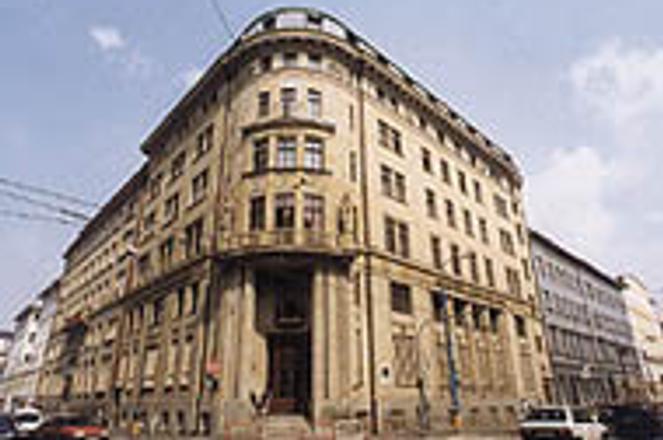IRB bank is in such poor shape that few investors are interested in buying it. The government, while putting a good face on it, clearly expects more from the sale of SLSP and VÚB.photo: Vladimír Hák
Investors have snubbed the sale of Investičná a rozvojová banka (IRB), forcing a date for registering preliminary interest in the bank to be put back by one month.
The government has insisted that despite the setback, in which only one party registered official interest in a 69% stake in IRB, the sale of the bank remains on track, as does the banking sector's overall revitalisation process.
"Yes, one party expressed interest [by the initial September 1 date], as we said, but the process is going on and we have put back the date [to the end of October] at the request of other parties who have expressed their continued interest," Juraj Renčko, head of the finance ministry's coordination unit for restructuring and privatisation of banks, told The Slovak Spectator September 19.
With bank restructuring finished after a process which saw the government move nearly 100 billion crowns in bad debt and poor loan portfolios from a number of banks, the government had seen only one foreign bank, Austria's BAWAG, make public its interest in IRB before the latest announcement.
Renčko claimed that the change in the date was in accordance with regulations sent to all potential bidders, and that far from the sale having taken a blow, interested parties would now have more time to study the bank closely.
"There are no problems and everything is proceeding as planned. We are pleased with the progress that has been made," he said.
One of Slovakia's three largest state-owned banks, along with Slovenská sporiteľňa (SLSP), the country's largest bank, and Všeobecná úverová banka (VÚB), IRB is seen as the least attractive prospect of the three for an investor, having in 1997 been put under a caretaker administration by the central bank following woeful loan administration.
The ministry has repeatedly claimed a high level of interest in the three banks from institutions both within and without Europe. However, while Austria's Erste Bank and Bank Austria have publicly declared their interest in the state's 87% share in SLSP, speculation has grown over other potential investors with the Finance Ministry reluctant to release precise details of interested parties.
"It's difficult to begin speculating, but banks like Erste Bank would be most interested in SLSP, they're a front-runner, and with both VÚB and IRB we could be looking at a bank that wants to get onto the Slovak banking market, to take a licence. I think that when we find out who is interested in IRB we'll get a clearer picture of those that are interested in VÚB as well," said Martin Kabát of brokerage Slávia Capital.
Deputy Finance Minister Viliam Vaškovič said September 19 that three investors would be allowed to carry out due diligence in SLSP, but refused to specify who those three entities were. However, Renčko said that all three were "reputable international banks".
The Finance Ministry should receive final offers for SLSP in mid-November, offers which should be reviewed by November 24 and a final contract signed by the end of this year.
VUB's status to be enhanced
The government's only confirmation of interested parties in any of the banks came September 19 when Vaskovic confirmed that the European Bank for Reconstruction and Development (EBRD) had carried out a due diligence at VÚB and an offer to do the same would soon be made to the International Finance Corporation (IFC). Both firms are expected to be offered a smaller, minority share from the full 84% on offer in VÚB.
While officials at the EBRD said they could not confirm that a due diligence had been carried out they confirmed that they had been "working with the relevant authorities with regard to VÚB".
Both institutions had told the ministries of their interest in the Slovak finance house in July and at that time the EBRD said that it was also interested in some of the shares on offer in SLSP. However, analysts believe that while the EBRD's presence in VÚB would be welcomed by the government, SLSP's relatively more stable position would negate the chance of either the IFC or EBRD taking a stake.
"These two institutions don't want to make a profit from coming into VÚB. In entering the bank they would be giving it a possibly more trustworthy status, and might get the government a bit more money when selling their stake," said Tomáš Kmeť, banking sector analyst at Slovenská sporiteľňa (SLSP).
However, he added: "But they would be [allowed to] enter VÚB because it is in a less stable position than SLSP, and their presence would bring some stability. I don't think we'll see the EBRD or IFC on the shareholder list of SLSP."
Vaškovič said that a strategic partner for the bank should be chosen by the end of November.
The successful revitalisation of banks and the planned entries of foreign strategic investors into key institutions within the sector has promised a boom for the corporate sector through more loans and more selective credit extending (see story pg BFII), but is also expected to boost the perception of the sector's strength among individuals and foriegn businessmen.
"People will generally have a much better perception of banks in general [now and after privatisation]. If you look at the banks individually you see that those with foreign capital have lower interest rates and while prior to privatisation management at the state banks are reluctant to lend to corporations, this should all change after entry [of a foreign investor]," said Slavia Capital's Kabát.


